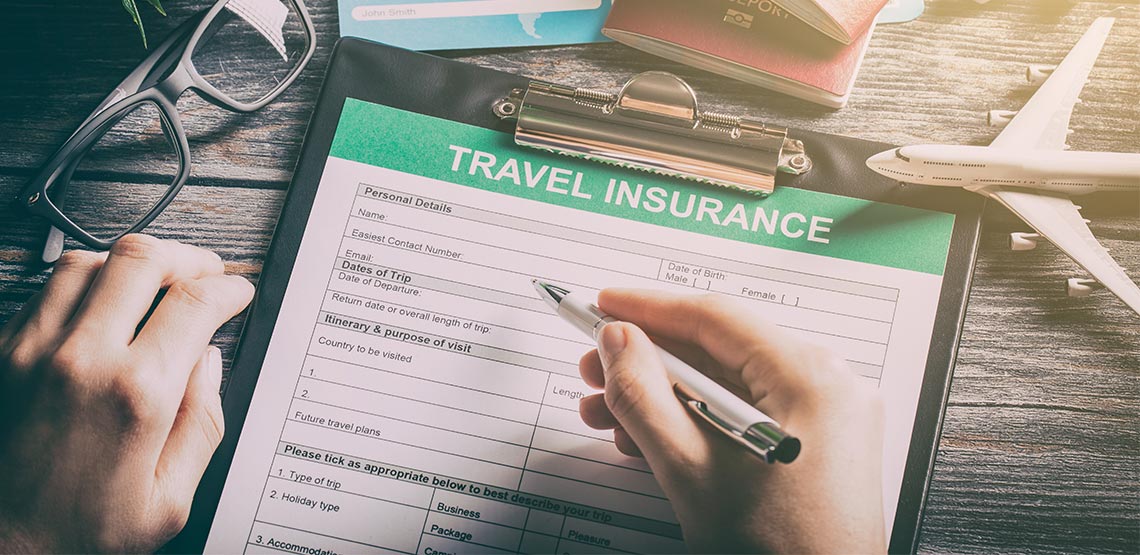How to Find the Best Travel Insurance
Our Guide to Getting Great Coverage for Just About Every Situation
In 2018, college student Kara Dunn decided to travel to Spain with friends, but she fell ill while there. Dunn began to experience tingling in her face and extremities, and when she woke up one morning, she discovered that she was paralyzed. Local physicians struggled to identify her disorder, initially thinking she had suffered a panic attack and then intubating her for pneumonia. Only with the help of her brother, a Mayo Clinic medical student, did doctors eventually reach a diagnosis: Guillain-Barre Syndrome, a potentially devastating neurological condition.
In a dramatic turn, Dunn began to recover. However, the pain and paralysis was only the start of her woes. The financial burden she and her family found themselves facing had the potential to last far longer than her illness.
“All we want is for Kara to be able to come home and get the best treatment available so she can regain her strength,” her brother said. “However, the only way this is possible is if she is air evacuated to Arizona. The cost of the emergency flight back to the United States, general medical expenses, physical therapy and transportation/housing for our family is over $100,000.”
Amazingly, the Dunn family was able to raise those funds through a successful crowdfunding campaign. Yet they could have avoided that strain and uncertainty by taking the simple step of purchasing travel insurance.
Not only does the best travel insurance protect against cancellations, such policies can also contain medical provisions that pay medical bills in the event of an emergency. Read on to learn more about how travel insurance works, how to shop for it, and different plans and providers.
“But Do I Really Need Travel Insurance?”
Travel is expensive, no doubt about it. After booking flights, reserving rooms, contracting with tour guides, and ordering the specialized clothing you need for that Patagonia hike or surfing in the Philippines, the last thing you want to do is shell out more money. And for many, travel insurance seems like just more money. Does anyone really need it? Do the insurers really pay out? Isn’t the whole thing just a scam?
As we noted in 2016, “The truth is, if you decide to opt out of getting travel insurance, it may become one of your biggest travel regrets.” Why? Well, thoughts of medical situations similar to the one mentioned above come to mind. Travel insurance can help in other situations, though.
Many policies will allow you to purchase replacement clothing lost in a luggage mishap, reimburse you if a terrorist attack causes a cancellation, and (incredibly importantly) provide you aid in your own language in case of a medical or some other emergency. That’s in addition to reimbursement for tickets and other reservations in a whole host of other situations, including (at least for some policies) any reason at all.
In short, you may get away with opting out of insurance for quick jaunts to relatively close locations, particularly if you travel domestically. Then again, you may not, and the longer a trip lasts and the farther from home you find yourself, the greater the risk of running into a problem. Insurance defrays that risk — and that’s the entire reason to get it in the first place.
How Travel Insurance Works
Though the idea of insurance is simple enough, it can become complicated in practice. Travel insurance is no exception to that rule. According to the US Travel Insurance Association (USTIA), “Most travel insurance policies usually bundle the following three types of coverage into one comprehensive policy: Financial reimbursement for trip cancellation, interruption and delay in situations arising from conditions such as illness or bad weather and for baggage loss and/or delay; medical insurance and medical evacuation coverage in case you become ill or are injured while traveling; [and a] 24-hour assistance line to help find doctors, help arrange accommodations, contact your family or other assistance in case of emergency.”
While that sounds simple enough, the proverbial devil is in the details.
For instance, even that statement from the USTIA doesn’t tell the whole story. Recent industry innovations include offering policies that only cover tiny slices of liability such as trip cancellations, lost baggage or medical mishaps. Some insurers provide annual policies that cover you for any trip you take within a one-year period. Some will pay you back a large portion of your trip costs if you choose to cancel for any reason whatsoever. Some safeguard against theft in addition to lost luggage.
You get the idea — despite the essential simplicity of travel insurance, it can end up having a lot of moving parts. That’s why you should know a few general principles so you can get the best travel insurance.
Tips, Tricks and Important Guidelines for Finding the Best Travel Insurance
When it comes to comparing different kinds of policies, you need to know a few simple guidelines so you can find the best travel insurance for your situation. Remember how we mentioned that travel is expensive and purchasing travel insurance only makes it more so? Well, it helps to know roughly what it costs beforehand.
As you might expect, estimates vary from expert to expert who estimate cheaper forms of coverage at anywhere from 3 to 5% of total trip cost and more expansive policies at 8 to 12%. Why so pricey? The extent of coverage naturally plays into the cost. But travel writer Rick Steves says that an individual’s age does, too. He maintains that “rates go up dramatically for every decade over 50, while coverage is generally inexpensive or even free for children 17 and under.”
Another even more fundamental tip involves something all of us should do and few of us actually manage to, namely reading the fine print. No guide can serve as a substitute to actually reading your policy slowly and carefully. For instance, a number of travel insurers offer secondary coverage, meaning they only pay out for a particular coverage after you’ve filed a claim with another insurer (typically one providing health or homeowner’s insurance). If you buy primary coverage, though, that means you can ignore your other policies. Everything goes directly to the travel insurer from the get-go.
Also, you need to understand the technical definitions of some terms. “Trip cancellation” and “trip interruption” might sound like the same thing, but they most certainly aren’t. If your policy provides for trip-cancellation coverage, you will get reimbursed if you don’t get to go on your trip. Trip-interruption clauses, though, mean you get money back if you have to cut your trip short once you’ve started it.
And don’t expect that you’ll see a check for every cent. Typically such coverage only provides for part of your expenses, although the golden rule of all insurance still applies: you’re only covered for what you can find in print.
Indeed, that truism catches a lot of people off-guard when it comes to things like preexisting conditions. People tend to think of not being able to cover extant medical issues when they hear that term, and that can apply to travel insurance. In fact, Travel + Leisure claims that failing to consider preexisting conditions is the top reason why insurers reject claims.
But that doesn’t just cover complications from a recent cancer diagnosis or a long-running personal history of diabetes, although illnesses can certainly play a part. If you have a previously known health condition, check to make sure that a potential policy has a waiver for preexisting conditions. Most policies that do will pay for medical expenses incurred on your trip just so long as you make your insurance purchase within a short period of making your booking (it’s typically anywhere within two to three weeks).
It doesn’t have to be your preexisting medical condition either. Some policies will allow you to cancel if the preexisting condition belongs to a family member.
Other kinds of preexisting conditions that travel insurers won’t touch have nothing to do with your personal well-being. Did you know that hurricanes count as preexisting conditions? A travel insurance policy won’t cover a cancellation if you buy it while a named storm is brewing out in the ocean. (Unnamed tropical depressions still fall under virtually all guidelines.)
Many insurers also take geopolitical tensions into account and won’t write policies if you plan to travel to unstable areas.
Even if you travel to relatively safe areas, consider springing for extra coverage if you think you might get injured or fall ill. An evacuation provision would’ve gotten Kara Dunn back to the United States for a nominal fee rather than $100,000. And while ponying up for accidental death and dismemberment coverage sounds a bit grim, it provides an added sense of security in case the worst happened.
However, know this: don’t hurt yourself or run into legal trouble while imbibing excessively or using controlled substances. Pretty much all policies disallow claims due to drunkenness or illegal behavior.
How to Buy Travel Insurance
Want to know how you can buy travel insurance? Look no further than your wallet.
Use Your Credit Card
Many credit cards offer coverage as part of their cardholder benefits. For instance, Chase Sapphire Reserves provides trip cancellation and interruption insurance, baggage delay insurance, lost luggage reimbursement, emergency evacuation and emergency medical benefits.
Hilton Honors will give you travel accident coverage, but note that coverage only extends to injuries sustained while on a plane, automobile or vessel where the ticket was completely paid for on the card.
Capital One Venture offers similar perks that are equally limited. In fact, “limited” is often the perfect word to describe card-based travel insurance. It often has much lower limits than other forms of coverage and more restrictions.
Buy a Traditional Travel Policy
If you decide that a more traditional travel policy would better fit your needs, know that most travel agents will sell one to you. Though they do receive a small commission, don’t worry that they’re offering low-quality policies. The vast majority of them are legit.
However, exercise caution when purchasing from tour operators or cruise lines. The problem there lies less with the policies and more with the entities behind them. If a guide or cruise company goes out of business, you could find yourself out the cost of the trip, the cost of the insurance — and without any coverage to defray those expenses.
Research Using an Online Aggregator
It’s not at all hard to find good policies from reliable insurers on your own. Numerous online aggregators will gather your trip information and provide you with a list from which to choose. Each aggregator has its own unique perks that draw customers.
InsureMyTrip.com automatically removes poorly reviewed insurers from its network, while Squaremouth has earned kudos for excellent customer service and maintains an up-to-the-minute tickler of events that might affect coverage.
AardvarkCompare promises the lowest comparable cost on any offered plans and donates 10% of profits to charity. Travel Insurance Review provides an educational slant, and TripInsurance.com allows you to easily adjust your policy.
When hiking alone, there are many things to plan for. From snacks to bring and clothing to pack, here are the top solo hiking essentials.
Finding a Specific Insurer to Suit Your Needs
Of course, you can always search out a specific insurer and approach it directly. If doing so, it doesn’t hurt to peek at a company’s AM Best rating to make sure it’s financially strong. Understand that you’ll need a free registration to use the website. Also, you may find it challenging to nail down the financial healthiness of a specific subsidiary if it’s owned by a much larger parent company.
That being said, following you’ll find a list of general and specialty insurers that can help you safeguard your trip of a lifetime.
Allianz Global Assistance
If you’ve bought a plane ticket any time recently, you’ve probably seen a plug for Allianz Global Assistance, the 500-pound gorilla in the travel-insurance market. Other insurers may have more specialized offerings, but given Allianz’s size, it’s often harder to find one with cheaper prices. You can’t go too wrong with this one.
Travel Guard
Travel Guard, a subsidiary of insurance giant AIG, also provides good coverage for most situations. The company has a reputation for prompt service and good customer engagement.
Berkshire Hathaway Travel Protection
Sometimes, though, you want things to happen just a little quicker, and Berkshire Hathaway Travel Protection says it processes claims five times faster than others in the industry. Basically what you’d expect from the Warren Buffet-backed company with the name of one of the world’s best corporations behind it. Even better, its AirCare policy provides fixed payouts for common hassles such as getting stuck on the tarmac, missing connections, departure delays and late-night delays.
Travelex
Part of an Australian insurance behemoth, Travelex offers great general-purpose travel insurance. Families in particular will like the Travelex Travel Select plan, which covers children ages 17 and below for no extra cost. In fact, they’re automatically added, and all you have to do is list their names during the application process.
Seven Corners
Those whose school-aged children aren’t traveling with them might want to consider Seven Corners. A private, U.S.-based insurer, Seven Corners offers a wide variety of plans, and its Liaison Student Travel Insurance is designed to provide medical coverage for students studying abroad. (It isn’t just for kids either. Guidelines include students, faculty members or full-time scholars up to the age of 65.) The policy provides comprehensive medical coverage and evacuation coverage. Note, though, that it won’t cover United States citizens traveling to American territories such as Puerto Rico or Guam.
World Nomads
World Nomads has a partner in no less than Lonely Planet, the long-running publisher of intensive, well-researched travel guides for nations all across the globes. In fact, as of press time, World Nomads will insure you on a trip to any nation. That’s a good thing for adventure lovers, as is the broad array of extreme activities the company will cover (e.g., bungee jumping, skydiving, hang gliding, scuba diving, bobsledding). Seven Corners’ Liaison Travel Medical Insurance also has an optional rider that will cover extreme sports.
Generali Global Assistance
Love a sport that’s a little more sedate, like hitting up the links? Generali Global Assistance sells coverage specifically for golfers. These policies can cover lost, broken, or stolen clubs and non-refundable tee times.
How to File a Claim
Hopefully, you’ll never need this section, but trouble sometimes strikes. When it does, you need to know the basics of how to process a claim. For starters, the USTIA’s official fact sheet recommends always carrying a copy of your policy with you. Not only does this remind you of your coverage categories and limits, it also provides essential contact information. Should trouble arise, you’ll know exactly who to call.
After making that call, you’ll have to deal with one of the most dreaded aspects of insurance: paper. Want to get reimbursed? Then you’ll need to provide documentation. Failing to provide adequate, hard-copy evidence as backup has sunk many a claim. However, if you keep a tickler of all of your expenses (an envelope stuffed with receipt may suffice), then it will go a long way to ensuring you have adequate paperwork.
Of course, most trips don’t require filing a travel-insurance claim — and that’s the way we like it. For many of us, travel insurance provides the most important thing for an enjoyable excursion: peace of mind.









